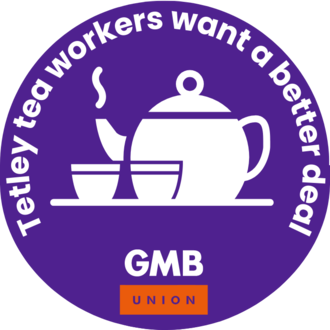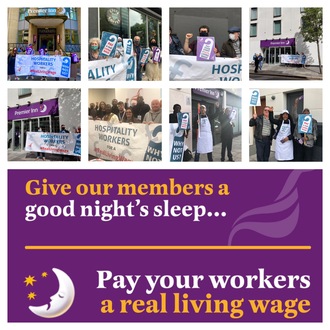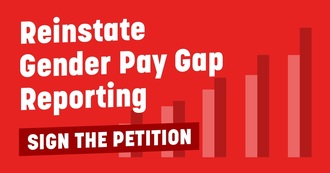-
GMB Asda Pay JusticeEqual pay in ASDA matters because it is a glaring injustice and subjects women and families to lives of entrenched poverty and opportunity gaps.170 of 200 SignaturesCreated by Laura Maughan

-
Pay Fair for Patient Care – support Mid Cheshire Healthcare AssistantsHundreds of nursing support staff at Mid Cheshire hospitals have been working above their pay grade for years. We are calling on their trust to pay them the wage they deserve and to award back-pay for years of underpayment.688 of 800 SignaturesCreated by UNISON North West
-
Equal Pay In SunderlandPlease show your support by signing this petition and let's send a clear message to Sunderland City Council that they should put right their discriminatory pay practices.3,449 of 4,000 SignaturesCreated by GMB NEYH .

-
Trouble brewing at tea giant Tata GlobalThese workers deserve fair pay for skilled work and an end to real terms pay cuts, their quality of life has been eroded over time, this needs to change for the workers, their families and for the future of decent paid jobs in Teeside.141 of 200 SignaturesCreated by Laura Maughan
-
Pay Fair for Patient Care – support Wirral’s clinical support workersAdd your name to this petition in support of Wirral University Teaching Hospitals NHS Trust Clinical Support Workers in their campaign for fair pay and recognition.3,447 of 4,000 SignaturesCreated by UNISON North West
-
Support the 13th Note workers!For too long hospitality workers have been subject to abusive, hyper-exploitative, unsafe and insecure working conditions. Workers at the 13th Note, represented by Unite Hospitality, are part of a sector-wide upsurge in union activity to tackle these problems and achieve decent and dignified jobs. We stand with our friends in other unions, such as the IWW, who also play a crucial role in organising our sector, seen recently in the Saramago dispute. We struggle not solely for ourselves but for the survival of the arts, cultural and live music scenes which are facilitated by our labour. Hospitality is a key component of social life in this country and we deserve to be properly compensated for our role in that.5,819 of 6,000 SignaturesCreated by the 13th Note Workers
-
Stop the cuts to Support staff wagesSchools Support staff are vital to the running of our Schools and the education our Children. We believe the success of our School and the education they provide will be badly affected by these proposals. School Support staff are some of the lowest paid staff in Schools and proposals to cut their wages in the middle of a cost of living crisis is harsh and wrong.92 of 100 SignaturesCreated by Katherine Mitchell
-
Stronger legal rights to flexible workingFour out of five workers want to work flexibly and 92 per cent of mums who worked flexibly told us they would find it difficult or impossible to do their job without it. But current flexible working rights are way too limited – workers only have the right to request flexibility after 6 months in the job. Employers can turn down requests for a huge range of reasons – one in three requests for flexible working are turned down. So far, the government has failed to act, and its consultation on flexible working last year proposed making the right to request a day one right, but this is tinkering round the edges of a failed policy. People who need to work flexibly - mums, dads, carers, disabled workers, older workers - need to know whether flexibility is available before they even apply for the job. A day one right to ask would mean having to ask at interview or one your first day in the job, and loads of people won't feel comfortable doing this for fear of rejection or being seen as 'awkward' by their employer. That’s why employers must be legally required to include flexible working options in job adverts and everyone needs the right to have flexible working, not just to ask. Secretary of State for Business, Kwasi Kwarteng, sets the rules here. He could bring legislation to build up our rights to flexible work. We’re calling on him to help make work more flexible for everyone.20,900 of 25,000 SignaturesCreated by The TUC and Mother Pukka
-
Your Workforce deserves the Real Living Wage and Union RepresentationWith over 34,000 employees in 821 hotels and 411 pubs and restaurants Whitbread (owners of Premier Inn and familiar Brands such as Beefeater and Brewers Fayre) are one of the largest employers in the U.K. hospitality sector. As such they have a moral obligation to build back better after the Covid crisis by setting benchmark standards for decent pay and progressive employee relations.395 of 400 SignaturesCreated by Dave Turnbull
-
University of Birmingham: let us choose to work flexiblyOver the past year, we have successfully adapted to remote working made necessary by the pandemic. We have worked hard to ensure the work of the University has continued, in a safe and effective way. We have made sure systems still run, research is able to continue, and students are still able to have the best experience possible. Feedback from University management has rightly recognised this: "We can all feel proud of the quality of education that we have been able to maintain in the most difficult of circumstances. [It] is a testament to your dedication, and to the supportive environment that you have all helped to create." "Indeed, one of the more positive lessons of the pandemic is that we can do some pretty fabulous things online." (Emails to all staff from Head of College of Social Sciences) We have done all this from home. While the COVID-19 crisis has brought many challenges, there have also been opportunities. Being able to work from home has meant a better work-life balance, and more inclusive ways of working for disabled staff and those with caring responsibilities - often met by women. We are concerned that one of the few positive points of the COVID-19 pandemic - our ability to work flexibly and remotely, improving our work-life balance and our productivity - will be lost as we begin to emerge from lockdown. We ask the University to make sure this does not happen, and staff at all levels are enabled to keep working well. We Need to Keep Working Safely As the most recent lockdown begins to lift, we want to ensure we are able to keep these flexible working arrangements, where they work for us. This means ensuring that all those who want to continue to work from home, and for whom it is practical and accessible to do so, are able to keep the flexibility they have been able to work with, without having to go through onerous formal application processes. This also means ensuring disabled, chronically ill and neurodivergent staff have the right adjustments in place both at home and on campus, right from the beginning of their employment, to enable them to work safely, productively and flexibly. We ask the University to work with UCU, Unison, Unite and GMB to ensure all staff are able to work in ways that work for them, including having the right adjustments in place to enable us to work flexibly. The Benefits of Remote and Flexible Working It has been argued by organisations such as the Chartered Management Institute that home working, and other flexible working arrangements, can be a part of closing gender and disability pay and leadership gaps, as well as improving the attraction, retention, progression, and well-being of employees. The University of Birmingham’s own research into increased flexible working during COVID-19, in partnership with the University of Kent, found that most respondents noted they would prefer to work more flexibly in the future (including 52% of all parents and 66% of non-parents), after benefitting from a better work-life balance, increased productivity and improved wellbeing during lockdown. The University's Business School has also written about some of the benefits of home working, flexible working and blended approaches. Research from Cardiff University and the University of Southampton found that 70% of employees surveyed found their productivity either stayed the same or increased while they were working from home. The Government itself has argued flexible working - including flexi-time and home working - should be normalised, stating it would ‘boost productivity and particularly help women and those outside major cities’. By enabling all staff to continue working in ways that work for them, the University can make meaningful progress on some of its targets around dismantling structural barriers faced by groups within the University, as part of its 2021-24 Equality, Diversity and Inclusion scheme. This includes demonstrating the University’s commitment to being a “Disability Confident” employer, by ensuring the benefits of remote and flexible working for disabled people are not lost; and making it easier for those with caring responsibilities to balance these with their work. Home working can also contribute positively to the UoB Sustainable Travel Plan by reducing travel to campus and surrounding areas, and address the significant issues that staff have faced with parking on campus. Trust us to Work Well An earlier email from the chairs and co-chairs of the University’s staff networks stated that there was clear evidence of ‘a desire for global culture change that embeds a transparent trusted approach in relationships between staff and leaders.’ We ask the University of Birmingham to trust staff, who have consistently demonstrated their ability to adapt and deliver to a high standard, given the right support. We ask the University of Birmingham to demonstrate its worth as an employer that trusts and empowers its staff: trust us to work flexibly, in ways that work for us, and that benefit everyone.648 of 800 SignaturesCreated by Birmingham UCU

-
Normal pay for isolating Stoke Care WorkersOver a year into the COVID-19 pandemic, thousands of Stoke care workers have been, and continue to be, financially penalised for doing the right thing and protecting the vulnerable people they care for. Proper sick pay is known to prevent the spread of infections to service users and the wider community. Care workers need the assurance that they will not be financially penalised when they need to self-isolate. In Stoke, the majority of care workers who have spoken to UNISON have reported that instead of receiving their normal pay in line with Government guidance, they are having to survive on SSP at £96 per week, use annual leave, or in some cases get nothing at all. This is despite care employers receiving millions in public funds and being instructed to use them to pay self-isolating care workers their normal wages.428 of 500 SignaturesCreated by Becca Kirkpatrick
-
Do Not Suspend Gender Pay Gap ReportingTracking what happens to women’s pay is vital to building a fairer future and holding employers to account. Businesses have to report on a wide range of regulations/requirements - but gender pay gap reporting was the only one suspended last year. That can’t be right. Equality isn’t a nice value to have — it is essential. Especially in a time of crisis. Decades of progress in gender equality is being undone in a matter of months. Women have faced greater economic hardship through this pandemic, disproportionately losing jobs and income. Low paid women, black and minority ethnic (BME) women, disabled women and working mums are experiencing some of the most acute impacts. Women that were already at greater risk of being treated unfairly at work. Analysis by the TUC unearthed a staggering 35% pay gap for disabled women double that of the average gender pay gap, and that BME women are overrepresented in low paid, insecure jobs compared to white women and men. Join Grazia, Mother Pukka and the TUC as we call on Liz Truss MP, to maintain the requirement for larger employers to report on their gender pay gap in 2021 and to urgently introduce legislation requiring employers to report on ethnicity and disability pay gaps. We need you to show up for equal pay. Because equality isn’t a nice to have, it is fundamental. https://mcusercontent.com/ebd004a8047907dc47d269fd1/images/cb0315e4-99a5-4bb4-8d6d-0cfcd180bd0a.png10,202 of 15,000 SignaturesCreated by Trades Union Congress, Mother Pukka and Grazia

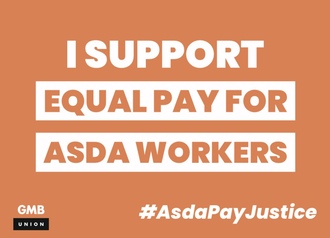
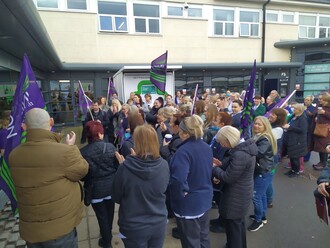
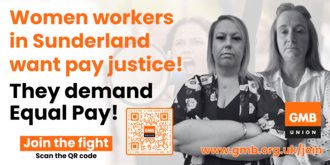%2012%20Sept.png)
